|
|
|
Sort Order |
|
|
|
Items / Page
|
|
|
|
|
|
|
| Srl | Item |
| 1 |
ID:
105153
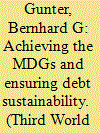

|
|
|
|
|
| Publication |
2011.
|
| Summary/Abstract |
This article analyses the growth and debt distress prospects of low-income countries (LICs) based on projections of the 2009 World Economic Outlook (WEO). It then reviews various debt sustainability concepts, including the appropriateness of the Bretton Woods institutions' current debt sustainability framework, and summarises the recent debt relief initiatives, including the Heavily Indebted Poor Country (HIPC) Initiative and the Multilateral Debt Relief Initiative (MDRI). It also examines the equity issues related to the recent debt relief initiatives and discusses various solutions suggested in the recent literature on how to ease the tension between making the necessary investments to achieve the MDGs while maintaining a sustainable debt.
|
|
|
|
|
|
|
|
|
|
|
|
|
|
|
|
| 2 |
ID:
083624
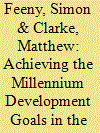

|
|
|
|
|
| Publication |
2008.
|
| Summary/Abstract |
Abstract: The Millennium Development Goals (MDGs) are a set of international development targets agreed to by members of the United Nations in 2000. The goals aim to improve many of the dimensions of extreme poverty and are to be achieved by 2015. This paper provides an overview of the issues relevant to the achievement of the MDGs in the Asia-Pacific region. The paper begins by discussing the critiques of the MDGs before assessing whether countries in the region are on track to achieve them. Issues relating to data availability and accuracy are discussed and the need to tailor the MDG targets to the special circumstances of some Asia-Pacific countries is examined. The paper proceeds by discussing the role of international assistance via international foreign development aid and non-governmental organisations in the achievement of the MDGs. The paper concludes with some policy implications for the international donor community.
|
|
|
|
|
|
|
|
|
|
|
|
|
|
|
|
| 3 |
ID:
146121
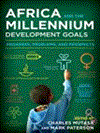

|
|
|
|
|
| Publication |
Lanham, Rowman and Littlefield, 2015.
|
| Description |
vi, 248p.pbk
|
| Standard Number |
9781442256255
|
|
|
|
|
|
|
|
|
|
|
|
Copies: C:1/I:0,R:0,Q:0
Circulation
| Accession# | Call# | Current Location | Status | Policy | Location |
| 058725 | 338.96/MUT 058725 | Main | On Shelf | General | |
|
|
|
|
| 4 |
ID:
105157
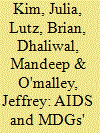

|
|
|
|
|
| Publication |
2011.
|
| Summary/Abstract |
Progress towards the Millennium Development Goals (MDGs) has been mixed, and many observers have noted the tendency for development actors to address individual MDGs largely in isolation from one another. This in turn has resulted in missed opportunities to catalyse greater interdisciplinary collaboration and innovation towards MDG achievement. The term 'AIDS and MDGs' is gaining currency as an approach that aims to explore, strengthen and leverage the links between AIDS and other health and development issues. Drawing from academic literature and from MDG country reports, this article sets out three important pillars to an AIDS and MDGs approach: 1) understanding how AIDS and the other MDGs affect one another; 2) documenting and exchanging lessons learned across MDGs; and 3) creating cross- MDG synergy. We propose broader policy level implications for this approach and how UNDP and other partners can take this agenda forward. Because the MDGs explicitly locate HIV within a broader international commitment to human development targets, they provide a critical platform for development partners to galvanise resources, political will and momentum behind a broader, systematic and structural approach to HIV, health and development.
|
|
|
|
|
|
|
|
|
|
|
|
|
|
|
|
| 5 |
ID:
142238
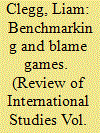

|
|
|
|
|
| Summary/Abstract |
Benchmarking has long been a central component of the global development industry, with the most prominent recent initiative being the Millennium Development Goal (MDG) framework. However, within existing scholarship, the agent-level interactions surrounding the MDG framework remain under-explored. Here, on the back of an analysis of interactions that took place within and around key MDG review summits, I develop a typology to clarify the intersection of benchmarking and blame games. Overall, I demonstrate that despite the efforts of the MDG architects to insulate the initiative, blame games have permeated policymakers’ engagements with the framework. Moreover, the content of these blame games have been carried over into the recently outlined Sustainable Development Goals (SDGs). A pattern of strategic clarification has seen the emergence within this follow-on SDG framework of more precise responsibilities on higher-income states to meet aid targets, and on lower-income states to meet governance reform targets. Given the deeply-embedded cleavages that were evident in UN review summits, similar blame games seem likely to follow the periodic evaluations within the SDGs’ lifespan.
|
|
|
|
|
|
|
|
|
|
|
|
|
|
|
|
| 6 |
ID:
138160
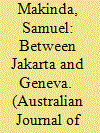

|
|
|
|
|
| Summary/Abstract |
Australia's engagement with Africa during the Rudd and Gillard governments was primarily driven by the national interest, which revolved around three issues: humanitarianism, support for mining corporations, and the United Nations Security Council seat. This article argues that there is a need for the Abbott government to retain the same depth and breadth of relationships with Africa. It is in the interest of both Australia and African states for the Australian government to remain committed to humanitarian objectives and to help African countries meet some of their Millennium Development Goal targets. Moreover, the continued support of Australian mining corporations operating in Africa, especially through the training of African policy makers in mining governance, is good for both Africa and Australia. Finally, Australia's continued success in multilateral diplomacy will depend on support from all parts of the world, including Africa. Australia's success at the multilateral level will, in turn, result in bilateral benefits in other regions, including the Asia-Pacific.
|
|
|
|
|
|
|
|
|
|
|
|
|
|
|
|
| 7 |
ID:
132912
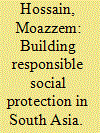

|
|
|
|
|
| Publication |
2014.
|
| Summary/Abstract |
inspired by the global ambition to eradicate poverty through the Millennium Development Goals, to be achieved by 2015, this article finds that continuing population growth in South Asia will make such goals impossible to achieve. Rather than sinking into despair, however, the article first captures specifically the major demographic reasons behind the troubling bottlenecks of development in South Asia. Since tackling those demographic issues will not yield tangible results in the short run, the focus of analysis then switches to arguing that other creative development remedies are indeed feasible. Given that there is no scarcity of food in South Asia, but it simply does not reach those who need it most, the article demonstrates that India's recent Food Security Act of 2013 may be a globally relevant model of concerted state action to tackle deep poverty and avoid mass starvation. This article breaks new ground in relation to implementing state-led social welfare measures, showing that earlier assessments about Asian development may have been too pessimistic.
|
|
|
|
|
|
|
|
|
|
|
|
|
|
|
|
| 8 |
ID:
135582
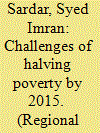

|
|
|
|
|
| Summary/Abstract |
On the onset of twenty-first century, the United Nations millennium summit unanimously adopted a millennium declaration. The declaration set out eight goals in which halving extreme poverty and hunger was prioritized as the goal number one. the remaining seven goals ( education; gender equality and women empowerment; reduction in child mortality; maternal health improvement; combating HIV/AIDS, malaria and other disease; environmental sustainability, and global partnership for development) deal with other dimensions of poverty.
|
|
|
|
|
|
|
|
|
|
|
|
|
|
|
|
| 9 |
ID:
130635
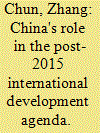

|
|
|
|
|
| Publication |
2014.
|
| Summary/Abstract |
The deadline for the UN's Millennium Development Goals (MDGs) is 2015 and the
international debate on post-2015 development goals has already begun. Currently, there
are three aspects to this debate that are not favorable to China and other developing
countries. Because China has not been paying enough attention to this, it should now
work to engage other nations in this debate and encourage a post-2015 agenda with the
core objectives of poverty reduction and sustainable development.
|
|
|
|
|
|
|
|
|
|
|
|
|
|
|
|
| 10 |
ID:
153137
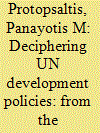

|
|
|
|
|
| Summary/Abstract |
A comparative analysis of the United Nations (UN) resolutions on the development decades reveals an evolution of the UN policies: a gradual shift from the modernisation paradigm to the human development approach, even though the goal of economic growth was never entirely abandoned. Despite this evolution, all relevant resolutions define quantitative targets on inputs and outputs to be met through recommended policy measures involving state intervention in the economy and the society, introduced into developing countries’ plans for development, in accordance with the teachings of the modernisation paradigm.
|
|
|
|
|
|
|
|
|
|
|
|
|
|
|
|
| 11 |
ID:
092167
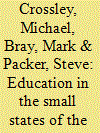

|
|
|
|
|
| Publication |
2009.
|
| Summary/Abstract |
Among the 52 member states of the Commonwealth, 28 have populations below two million. Small states thus comprise over half of the total. Within the group, most are at the lower end of the population scale: 22 have populations below one million, and 13 have populations below 250,000. The Commonwealth gives special attention to small states, and the Commonwealth Secretariat has taken a leadership role in identifying their distinctive features. At the same time, contexts and modalities have changed significantly over the decades. Most obvious have been the opportunities and challenges of globalisation. The internet has significantly reduced the isolation of small states, and has given opportunities to access expertise that could not previously have been imagined. Technological advances have facilitated forms of collaboration, such as the Virtual University for the Small States of the Commonwealth. The cross-national interconnectedness in this era of globalisation also brings challenges. Many small states are well advanced on the Education for All objectives and the Millennium Development Goals, but others have some distance to go. There is value in collaboration within the Commonwealth, both among small states as a group and between small states and larger entities. The Commonwealth experience can inspire learning among small and larger states that are not members of the Commonwealth. The main issues covered in this paper include migration, planning higher education, and issues of co-ordination, integration and regulation. This ongoing study welcomes feedback and will build on the present analysis to identify further strategic priorities for educational planning and research in small states.
|
|
|
|
|
|
|
|
|
|
|
|
|
|
|
|
| 12 |
ID:
105156


|
|
|
|
|
| Publication |
2011.
|
| Summary/Abstract |
This article reviews proposals regarding the recent food crisis in the context of a broader, threshold debate on the future of agriculture and food security. While the MDGs have focused on eradicating extreme poverty and hunger, the food crisis pushed the hungry over the one billion mark. There is thus a renewed focus on agricultural development, which pivots on the salience of industrial agriculture (as a supply source) in addressing food security. The World Bank's new 'agriculture for development' initiative seeks to improve small-farmer productivity with new inputs, and their incorporation into global markets via value-chains originating in industrial agriculture. An alternative claim, originating in 'food sovereignty' politics, demanding small-farmer rights to develop bio-regionally specific agro-ecological methods and provision for local, rather than global, markets, resonates in the IAASTD report, which implies agribusiness as usual ''is no longer an option'. The basic divide is over whether agriculture is a servant of economic growth, or should be developed as a foundational source of social and ecological sustainability. We review and compare these different paradigmatic approaches to food security, and their political and ecological implications.
|
|
|
|
|
|
|
|
|
|
|
|
|
|
|
|
| 13 |
ID:
135559
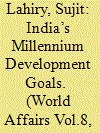

|
|
|
|
|
| Summary/Abstract |
The millennium development goals (MDGs) are a by-product of the United Nations Millennium Summit to institute certain time-bound goals by 2015. Eight goals were set forth and six core values identified as being essential to understanding international relations in the twenty-first century. As the countdown to 2015 is about to end, this paper looks at the extent to which the goals have been achieved in India regarding the issues of poverty, hunger and development. It also delineates whether they have led to the establishment of a more equitable, humane and just order. It is hoped that the MDGs do not remain mere wishes but are realized so that various forms of deprivation, marginalization and socioeconomic inequalities and inequities may be addressed, leading to the formation of a socially inclusive society in India. The article uses quantitative data and indices drawn from various UNDP reports.
|
|
|
|
|
|
|
|
|
|
|
|
|
|
|
|
| 14 |
ID:
138539


|
|
|
|
|
| Summary/Abstract |
Science and technology (S&T) and their applications pervade almost all aspects of modern existence. We have turned basic scientific knowledge into a treasure trove of technologies to serve human needs.
|
|
|
|
|
|
|
|
|
|
|
|
|
|
|
|
| 15 |
ID:
102344
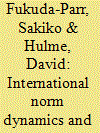

|
|
|
| 16 |
ID:
119947
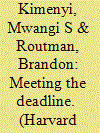

|
|
|
| 17 |
ID:
105154
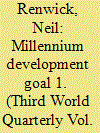

|
|
|
|
|
| Publication |
2011.
|
| Summary/Abstract |
This article considers three questions: 1) what progress has been made in achieving MDG1 targets?; 2) what challenges remain?; and 3) what more could and should be done? To examine these questions, the article assesses the progress of Southeast Asia in seeking to achieve MDG1. It argues that the region is 'on track' to achieve MDG 1 targets, although significant challenges such as inequality remain. Economic growth, significant structural change and incorporation into global value chains have contributed to MDG progress. However, this is a double-edged sword as exposure to global economic turbulence can increase. The longer-term reduction of poverty, inequality and social exclusion is a question of empowerment of local producers within value chains-a shift in economic power and control through pro-poor strategies strong enough to effect substantive structural change. The article outlines key concepts; identifies the main characteristics of Southeast Asian poverty; outlines what more needs to be done; and concludes by reprising the article's findings and weighing the prospects for 2010-15 and beyond.
|
|
|
|
|
|
|
|
|
|
|
|
|
|
|
|
| 18 |
ID:
091901
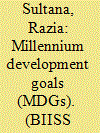

|
|
|
| 19 |
ID:
116871
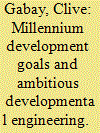

|
|
|
|
|
| Publication |
2012.
|
| Summary/Abstract |
Donor governments have been accused of not doing enough to achieve the Millennium Development Goals (mdgs), while the mdgs have been accused from other quarters of not doing enough for development. The former position takes the mdgs as an unquestionable good, while the latter posits them as a Western ruse for the sedimentation of core-periphery relations. This paper transcends this debate, identifying in the goals a logic of ambitious social, cultural and spatial engineering. Inspired by Foucauldian development anthropology, the paper highlights three themes implicit in mdg texts, requiring biopolitical interventions on bodies, societies and spaces, namely risk, sex, gender and family; Homo Economicus; and the city. The paper concludes with a reflection on the likelihood of resistance to such interventions.
|
|
|
|
|
|
|
|
|
|
|
|
|
|
|
|
| 20 |
ID:
058841
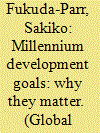

|
|
|
|
|
| Publication |
Oct-Dec 2004.
|
|
|
|
|
|
|
|
|
|
|
|
|
|
|
|
|
|
|
|
|